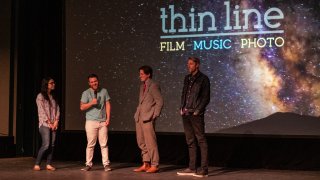
For two North Texas film festivals, streaming is the solution for the adage “the show must go on.” Rather than cancel or postpone Dallas VideoFest’s Alternative Fiction and Thin Line Fest, the two festivals partnered Falcon Events, a Dallas-based company specializing in producing live online and virtual events.
Thin Line Fest will stream its festival March 25-29. Dallas VideoFest’s Alternative Fiction will stream its festival April 3-5.
Joshua Butler, Thin Line’s founder and owner of Falcon Events, initially hoped the festival could go on as planned because the festival’s film and music venues are small, with a capacity less than 200. A couple of weeks before the festival was scheduled to begin, Butler’s priorities shifted.
“But then Wednesday came and I suddenly began to feel different about the whole situation. I started to read about the flatten the curve movement and it really clicked with me. I thought, if everyone stayed inside for two weeks, we could kill this virus. Wishful thinking, I know, but I realized that I wanted Thin Line to contribute to the solution and not the problem,” Butler said.
Thin Line Fest tried streaming before in 2018 and 2019, giving Butler’s board confidence in the concept of streaming the festival. Previously filmmakers hesitated to participate, concerned about missing out on lucrative streaming distribution deals with companies like Netflix.
“This time the circumstances are different. There are no film festivals happening this spring, so filmmakers have very few options to get their films shown. I was confident that we would get a better response. And we have! Of the 27 feature films that were originally scheduled to screen at Thin Line, 20 have opted in for streaming this year; and we didn't lose a single one of our 38 short films,” Butler said. “For the last six years, Thin Line Fest has included a photography festival. This year we printed nearly 250 photographs from around the world which were to be exhibited at two galleries in downtown Denton. We have since opted to move the entire photo fest online where attendees can browse all 240 images and vote for their favorites.”
Bart Weiss, founder and artistic director of Dallas VideoFest, became concerned about his festival when SXSW was canceled.
“After SXSW canceled, it was clear we were in a different world for film and for culture. The writing was clearly on the wall, something needed to be done,” Weiss said. “Watching a film should not make you sick and possibly die. It seemed to me to be socially irresponsible to put it on. I was out of options, but then I was talking to my friends at Thin Line Festival (where I was helping with programming) and heard they were doing an online festival, and I thought, “Wow, this is the right technology for the right moment.’”
Films will be streamed at a specific time with an introduction and there will be a Q&A with filmmakers following the films, giving the films a ‘live’ component.
“Well, do you remember the days of video stores? People would spend hours walking around trying to decide what to see. I call it the oppression of choice. Too much choice leads to inaction. And having until the end of time means you won’t see it. But making it an ‘event’that you have to schedule to do, you will actually do it. Sacristy leads to action,” Weiss said.
There are advantages to having the festivals online. “Well, for one thing we are not limited to one location. The Dallas VideoFest goes international, truly international, not just in its work but in its audience in one day. Look, people are in lockdown and they have probably watched everything they want to on Netflix and then need to be inspired. People want something else to do that they don’t have to leave the house for. In a time when people cannot gather in person, they can be in community with the filmmaker online. Instead of snipping on Twitter, we can have a discussion with a filmmaker about what they loved about their film and hear how it was made. The real advantage is we get to show work to people when they need to see it, in a way they can enjoy it,” Weiss said.

Online festivals cannot replace certain aspects of a traditional festival. “There is no denying the energy one feels with a theater full of people eagerly anticipating a premiere screening. Or being able to shake hands with the filmmaker or subject(s). You might even have a drink with the filmmaker at a nightly music event. So those are the things that are hard, if not impossible, to create online; but we're doing our best to create audience engagement opportunities during the virtual event,” Butler said. “Being able to introduce each screening, welcome our guests, and then moderate a post-screening Q&A with the filmmaker is essential to approximating what makes a film festival special.”
Streaming may have a role at future film festivals. “Perhaps it would be good to have partially live and partially online programming. But it is clear that culture will be different when we are on the other side of this,” Weiss said. “We, as people, as consumers of media and culture, will change. It is unclear how we as the cultural warriors and curators of this culture will adapt. But this is a first step in the right direction, and we are bold enough to go there, I assume others will follow.”
Learn more: https://thinline.us/ | http://videofest.org/alternative-fiction/
Other online opportunities from DFW creative community:
American Baroque Opera Company has its full-length production of La Serva Padrona by Giovanni Battista Pergolesi available for free on YouTube: https://www.youtube.com/watch?v=4ZVaiemiIZw&feature=youtu.be
Amon Carter Museum of American Art has developed an video series, Cooped Up with the Carter, on its YouTube channel: https://www.youtube.com/user/amoncartermuseum/playlists?view_as=subscriber
Avant Chamber Ballet produced a 360° World Premiere video of 19th Amendment from February 15, 2020 at Moody Performance Hall, choreographer Katie Puder and composer Quinn Mason: https://samsungvr.com/view/hpK76QpfnMs?fbclid=IwAR3MM0FBc8JdOpKCTqoY4n0mBIfMspGYjMh9ha37d3jBJAXvoD8wHDJvRMg
Dallas Arboretum has created several videos featuring Dave Forehand, the garden’s Vice President of Gardens, as part of its Digital Dallas Blooms on Facebook: https://www.facebook.com/dallasarboretum/
Dallas Museum of Art has over 25,000 works of art available for browsing: https://collections.dma.org/
Dallas Symphony Orchestra has created #MusicMinute and #Keepthemusicgoing on its social media platforms for music lovers to keep up with musicians playing in their homes: https://www.facebook.com/DallasSymphony/
Dallas Theater Center is selling virtual tickets to a filmed performance of Jose Cruz Gonzalez’s “American Marachi” through April 5: https://my.dallastheatercenter.org/american-mariachi/54292
Works from Kimbell Museum’s collection may be viewed online, with the ability to zoom in admire details: https://www.kimbellart.org/collection
Modern Art Museum of Fort Worth’s collection may be viewed online: https://www.themodern.org/collection
Perot Museum is offering “Amaze Your Brain at Home,” a rotating series of fun activities: perotmuseum.org.
Dallas actor Mikey Abrams created Quarantined Cabaret, a public Facebook group for performers – actors, musicians and dancers – to share videos of performances while in isolation. Performers of all ages have contributed, and the group currently has more than 17,000 members from around the world: https://www.facebook.com/groups/525799498339899/
Sixth Floor Museum is offering #Museumathome on its social media channels: https://www.facebook.com/SixthFloorMuseum/
Stage West in Fort Worth is preparing a streaming version of Lucy Kirkwood’s The Children. Its production was in previews when the theater was forced to close due to the coronavirus outbreak: https://stagewest.org/

